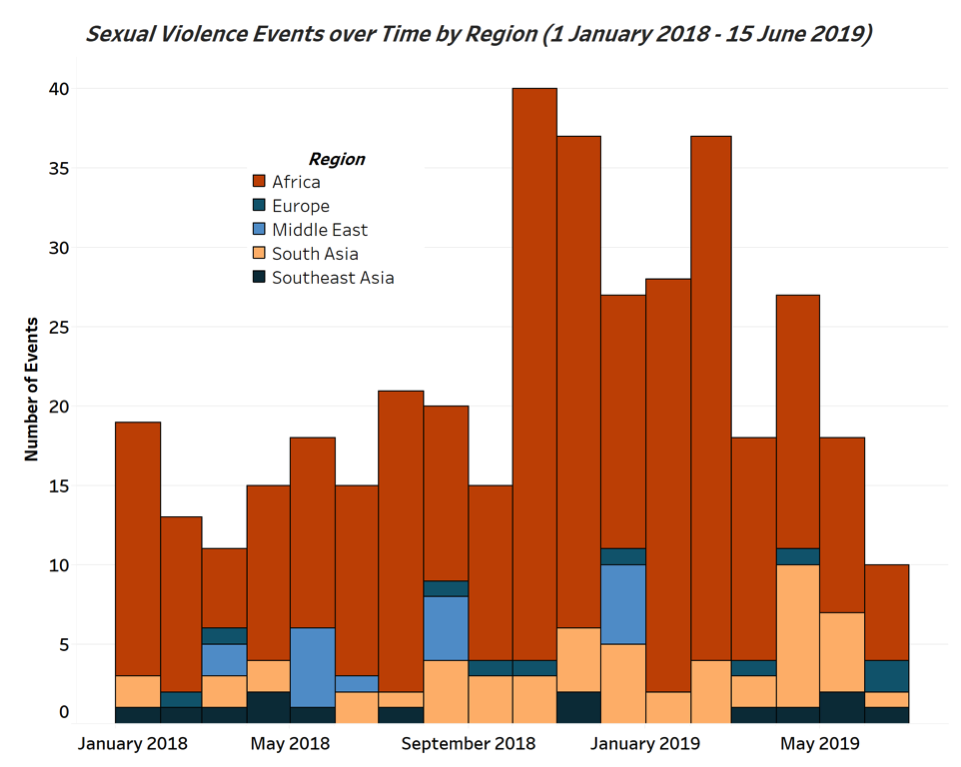19 June 2019: On the International Day for the Elimination of Sexual Violence in Conflict, ACLED data confirm that sexual violence remains a serious threat around the world — both inside and outside of war-time contexts. Over the past year, ACLED has recorded an overall increase in reported sexual violence events,* and across regions political militias and state forces are the primary perpetrators of public, political sexual crimes.
For more information on how ACLED tracks sexual violence, read our methodology brief; for more information on political violence targeting women and ACLED’s gendered associate actors, read our report and FAQ sheet.
Key Data Points:
- ACLED records nearly 400 sexual violence events from the start of 2018 to the present, including nearly 140 events reported so far in 2019
- The total number of reported events nearly doubled in the first three months of 2019 compared to the same period in 2018, largely due to an uptick in violence in the Democratic Republic of Congo, which consistently registers high levels of reported sexual violence
- 95% of sexual violence events in which the gender of the victim is reported target women or girls
- Since 2018, sexual violence makes up 27% of all political violence specifically targeting women or girls, though less than 1% of total recorded violence in the ACLED dataset
- Sexual violence events are often accompanied by lethal attacks, especially during armed conflict
- The largest proportion of reported sexual violence events is committed by political militias or unidentified armed groups, followed by state forces
- The lead perpetrators vary by region: while political militias and unidentified or anonymous armed groups are the main actors responsible for sexual violence in Africa and South Asia, state forces carry out the most sexual violence events in the Middle East, Southeast Asia, and Eastern and Southeastern Europe and the Balkans
- ACLED records over 100 government-perpetrated sexual violence events since the beginning of 2018, accounting for more than a quarter of all sexual violence events during this time period; this is most common in India, the Democratic Republic of Congo, Myanmar, South Sudan, Burundi, and Sudan
High-Risk Areas:
- Across ACLED’s coverage areas since 2018, by far the highest number of sexual violence events are reported in Africa, followed by South Asia
- Countries with the highest number of reported sexual violence events in 2018:
-
- Democratic Republic of Congo
- South Sudan
- Burundi
- India
- Sudan
-
- Countries with the highest number of reported sexual violence events in 2019 thus far:
-
- Democratic Republic of Congo
- India
- South Sudan
- Burundi
- Mozambique and Zimbabwe (tied)
-
A US-based 501c3 established in 2014, ACLED is the highest quality, most widely used, real-time data and analysis source on political violence and protest around the world.
If you would like to use ACLED analysis or visuals, please review our Terms of Use and Attribution Policy.
For press inquiries or interview requests, please contact:
Sam Jones, Communications Manager
*ACLED is an event-based dataset. The number of recorded sexual violence events is not equal to the number of reported sexual violence victims, in the same way that the number of violent events in the ACLED dataset is not equal to the number of reported fatalities. Though ACLED does indicate the number of reported victims of sexual violence events in the ‘notes’ section of the dataset when this information is included by the source, these counts are the most biased and poorly reported component of political violence data, and underreporting is especially common in cases of sexual violence due to backlash or normative concerns. For more information, read the methodology brief here.
___________
Download a PDF of this fact sheet here.
___________





